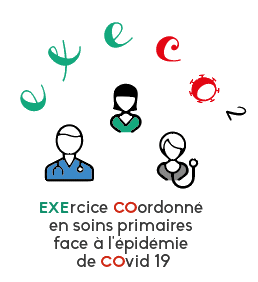EXECO2 SURVEY
Coordinated Primary Care Practice in Response to the Covid-19 Epidemic
TEAM
The team is made up of:
- Cécile Fournier, Public health physician and sociologist, Senior research fellow
- Noémie Morize, Research fellow
- Isabelle Bourgeois, Sociologist
- Lucie Michel, Research fellow
- Matti Suchier, Research fellow
- Laure Pitti (CRESPPA, Centre de recherches sociologiques et politiques de Paris)
PRESENTATION
Context: In the movement of structuring primary care carried by certain health professionals and supported by the State and the National Health Insurance, the Covid-19 epidemic has been disrupting organizations and practices since February 2020. It is revealing, but also undoubtedly accelerating ongoing transformations, and can even appear as the trigger for new evolutions. Knowing the way in which primary care organizations are dealing with this epidemic, in connection with their interlocutors in the territories under consideration, is essential in order to reflect on the ongoing transformations. This will also provide input for several surveys carried out by IRDES on the changes in the organization of primary care: EOS projects (evaluation of the Conventional Interprofessional Agreement (ACI, Accord conventionnel interprofessionnel) available to multidisciplinary group practices), ERA2 (evaluation of Article 51 experiments of the Social Security Funding Act) and PARAMED (understanding of paramedical practices in primary care).
Objective: Faced with the issues raised by the epidemic, in several territories with contrasting characteristics, it is necessary:
1) to shed light on the responses provided by the actors involved in the organization of primary care (identified issues, actions, organizations, systems and tools implemented, sources of information and resources mobilized), as well as the interactions between different professional groups, teams, institutions and sectors, including the hospital and the medico-social sector;
2) to understand what existing organizations have made possible, and how their objects and operations are themselves being disrupted and even transformed by the current experience. This will provide complementary knowledge to that derived from quantitative and qualitative surveys conducted by IRDES and other research teams among different professional groups and primary care organizations.
Method: This research is based on a multiple case study, relying on data collection through repeated interviews.
Six primary care teams were taken as a starting point. They were chosen for the diversity of their composition, their organization (multidisciplinary group practices and health care centres, whether or not they were participating in projects of Local health professional communities (CPTS, Communautés professionnelles territoriales de santé), whether or not they were involved in the national Article 51 experiments) and also their environment (rural, semi-rural or urban areas, with a more or less significant healthcare supply), in areas more or less affected by the epidemic.
Repeated interviews have been conducted by telephone or videoconference since March 2020 with doctors, nurses, pharmacists, speech therapists, podiatrists, dieticians, physiotherapists, caregivers, home care workers, secretaries, project managers, heads of establishments, coordinators (of multidisciplinary group practices, Local health professional communities, Local health contracts, continuity of care associations...), working as private practitioners, in health centres, hospitals, local authorities or regional public health institutions...
The analysis, carried out collectively by the six researchers, will lead, on the one hand, to a reasoned description of the way in which the actors in the territories investigated have organized themselves throughout the phases of the epidemic in order to provide responses to the needs identified, and, on the other hand, to a comprehensive approach to what, in the history of interactions between the actors concerned, has led to this type of organization of care, while at the same time changing the relationships between professional groups and institutions.
REALIZATION PERIOD
From March 2020 to March 2021
